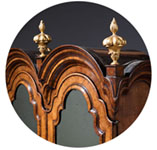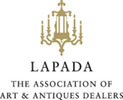17th Century William and Mary Japanned Cabinet on Original Silver Gilt Stand
Sold
Request Information
Follow Us
17th Century William and Mary Japanned Cabinet on Original Silver Gilt Stand
An important and exceptional quality late 17th century William and Mary japanned cabinet on original carved silver gilt stand, C.1690-1700
The upper part, decorated with coastal landscapes depicting homes, figural scenes, fauna and flora with a detailed gold and silver banding. Centred by an elaborate pierced and chased gilt-brass lock plate opening on engraved shaped strap hinges to a decorated chinoiserie interior consisting of ten drawers of differing sizes bearing their original ring pull handles. Each corner is protected with detailed engraved and shaped mounts. Similarly, the sides are decorated with fauna and flora.
The sensational original carved silver gilt stand is heavily carved and pierced terminating at a highly decorated waist moulding, raised on architectural palladium legs incorporating scrolls and swags. In the period, the back rail was covered in late 17th or early 18th-century chinoiserie wallpaper which remains intact. This is an important insight into the interiors of the period.
The stand shows great resemblance to the works of the most important Royalty appointed cabinetmakers of the late 17th and early 18th centuries, Gerrit Jensen, Pierre Golle and Thomas Pelletier. Palletier, son of Jean and younger brother of René (d. 1726). Thomas Pelletier’s apparent anonymity may be due in part to his having worked as a sub-contractor (with his brother René) for the older royal cabinet-maker, Gerrit Jensen. For example, a pair of highly sophisticated gilt stands for Japanese cabinets, which seem certain to have been carved by the Pelletiers, were probably supplied by Jensen to Queen Anne for Kensington Palace in c.1704). However, the stand is more exuberant than the Pelletier tables and stands in the Royal Collection but very similar in some ways, particularly the foliate scrolls and broken C-scrolls. It is probably more likely that the stand is a Jensen collaboration with Pierre Golle who seem to be responsible for the pieces like this in the Collection.
There are very few cabinets in original condition to bear their original stands, most of which are in museums such as the Victoria and Albert, The Metropolitan Museum of Art and National Trust Collections. (See literature)
This outstanding cabinet is one of the finest examples of the taste of the orient which became highly sort-after during the reign of William and Mary, Mary was the daughter of James II and her arrival in England was celebrated and bought great hope to the nation.
The East India Company with its royal charter from Elizabeth I had bought these exotic items to a new and excited audience. The courts of Europe had long been interested in the mystery of the orient and the outstanding new pieces created a highly sort aftermarket for Chinoiserie among the nobles.
Many books were produced at the time to explain the process and detail of the making of the new style, one such publication A Treatise of Japanning and Varnishing’ by John Stalker & George Parker, describes in full the process of Japanning and is still regarded as a key book of reference today.
Condition
Good. Wear consistent with age and use. A rare survivor in an outstanding state of preservation. Cabinet lightly conserved. The original silvering to the stand has been lightly refreshed.
Dimensions
Height: 67.72 in. (172 cm)
Width: 40.95 in. (104 cm)
Depth: 21.26 in. (54 cm)
Literature
A notably similar cabinet plausibly by the same maker is housed in (National Trust) Saltram, Devon (Accredited Museum). NT 871278. Adam Bowett, From Charles II to Queen Anne, Page 164, Plate: 5:33.
Royal Collection – Pier table, Bow Room, Buckingham Palace, attributed to Thomas Pelletier (1680-1723).
PREVIOUSLY SOLD
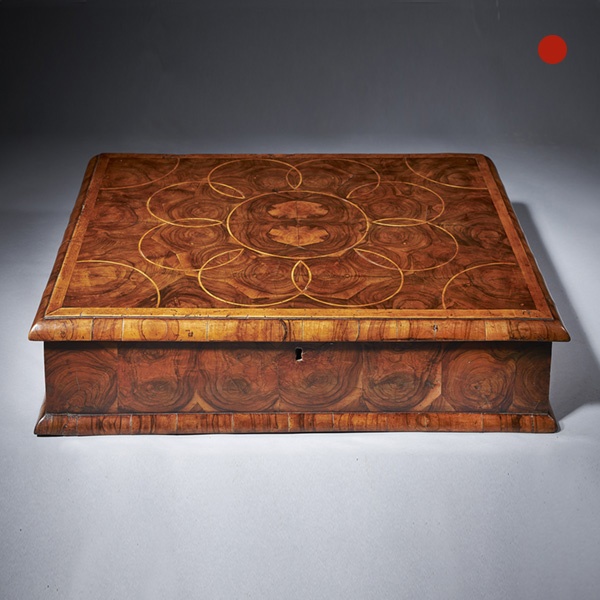
Fine and Rare Late 17th Century William and Mary Olive Oyster Lace Box
Fine and Rare Late 17th Century William and Mary Olive Oyster Lace Box Sold Follow UsFine and Rare Late 17th Century William and Mary Olive Oyster Lace Box A fine and rare late 17th century olive oyster 'lace box from the reign of King...
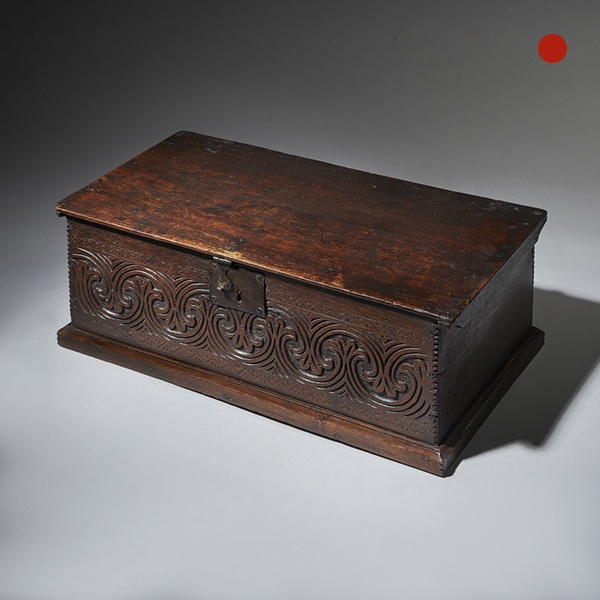
Late 17th Century Charles II Carved Oak Bible Box, Deed Box, Blanket Box,or Candle Box
Late 17th Century Charles II Carved Oak Bible Bo, Deed, Blanket, or Candle Box Sold Follow UsLate 17th Century Charles II Carved Oak Bible, Deed, Blanket, or Candle Box A superb and original late 17th century oak box with excellent and deep...
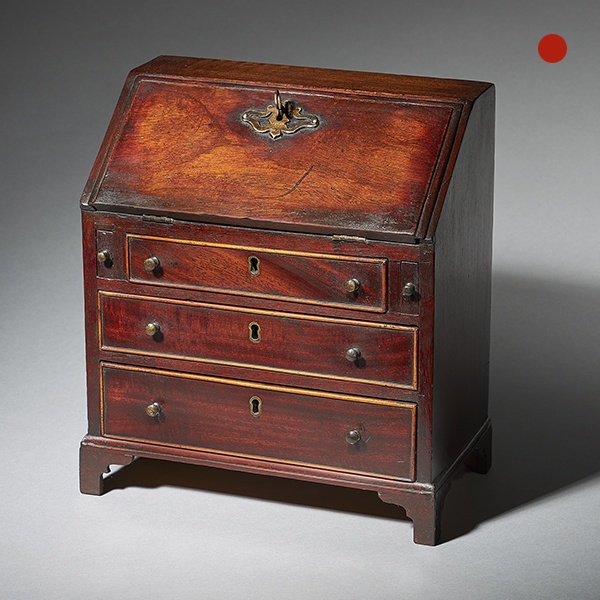
18th Century George II Mahogany Miniature Bureau
18th Century George II Mahogany Miniature Bureau SOLD Follow Us18th Century George II Mahogany Miniature Bureau What came first.... the miniature or the full scale? This small scale model at just 9” wide dates from the very beginning of the...
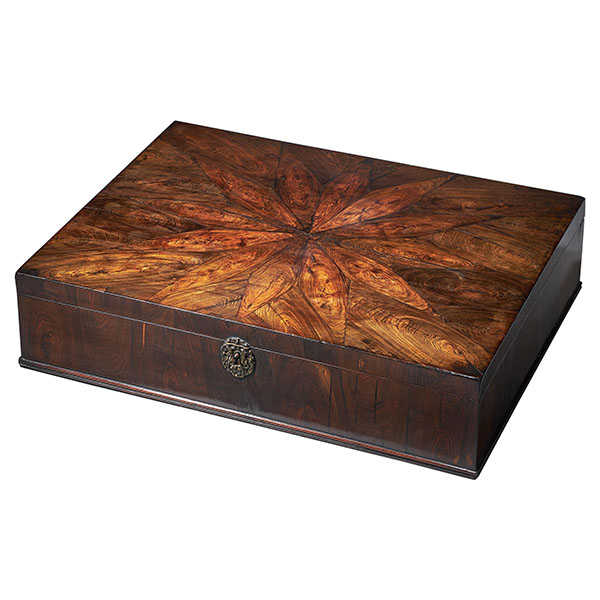
17th Century Charles II Cocuswood Lace Box, Circa 1660, England
17th Century Charles II Cocuswood Lace Box, Circa 1660, England SoldFollow Us17th Century Charles II Cocuswood Lace Box, Circa 1660, England An extremely rare and important Cocuswood oyster (Brya ebenus) lace box from the reign of Charles II,...
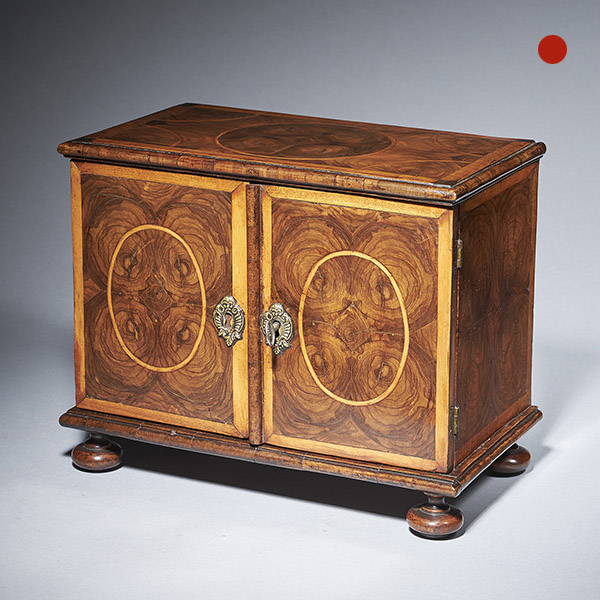
17th-Century miniature table cabinet
The miniature table cabinet opens to an arrangement of drawers, a row of four, a bank of four and a long pen drawer, similarly veneered in oysters of olive.
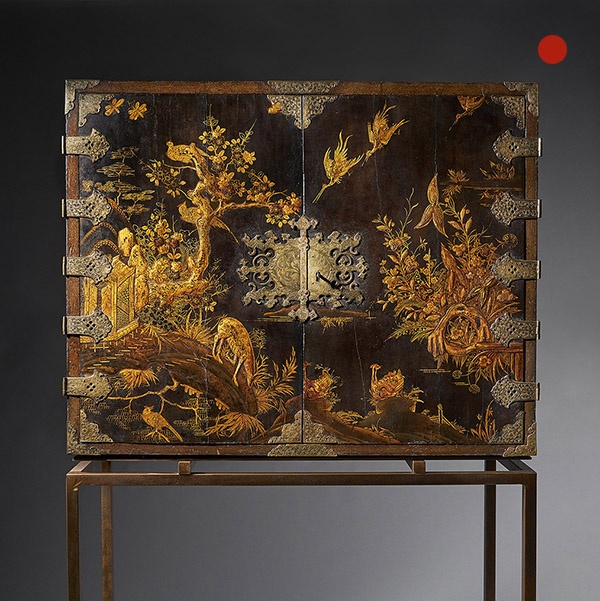
Charles II Japanned Cabinet of exceptional condition c. 1675 raised on a contemporary stand.
Charles II Japanned Cabinet of exceptional condition c. 1675 raised on a contemporary stand SOLD Follow UsCharles II Japanned Cabinet of exceptional condition c. 1675 raised on a contemporary stand An English Charles II Japanned cabinet of...

Fine and Rare Late 17th Century William and Mary Olive Oyster Lace Box
Fine and Rare Late 17th Century William and Mary Olive Oyster Lace Box Sold Follow UsFine and Rare Late 17th Century William and Mary Olive Oyster Lace Box A fine and rare late 17th century olive oyster 'lace box from the reign of King...

Late 17th Century Charles II Carved Oak Bible Box, Deed Box, Blanket Box,or Candle Box
Late 17th Century Charles II Carved Oak Bible Bo, Deed, Blanket, or Candle Box Sold Follow UsLate 17th Century Charles II Carved Oak Bible, Deed, Blanket, or Candle Box A superb and original late 17th century oak box with excellent and deep...

18th Century George II Mahogany Miniature Bureau
18th Century George II Mahogany Miniature Bureau SOLD Follow Us18th Century George II Mahogany Miniature Bureau What came first.... the miniature or the full scale? This small scale model at just 9” wide dates from the very beginning of the...

17th Century Charles II Cocuswood Lace Box, Circa 1660, England
17th Century Charles II Cocuswood Lace Box, Circa 1660, England SoldFollow Us17th Century Charles II Cocuswood Lace Box, Circa 1660, England An extremely rare and important Cocuswood oyster (Brya ebenus) lace box from the reign of Charles II,...

17th-Century miniature table cabinet
The miniature table cabinet opens to an arrangement of drawers, a row of four, a bank of four and a long pen drawer, similarly veneered in oysters of olive.

Charles II Japanned Cabinet of exceptional condition c. 1675 raised on a contemporary stand.
Charles II Japanned Cabinet of exceptional condition c. 1675 raised on a contemporary stand SOLD Follow UsCharles II Japanned Cabinet of exceptional condition c. 1675 raised on a contemporary stand An English Charles II Japanned cabinet of...
YOU MAY ALSO LIKE
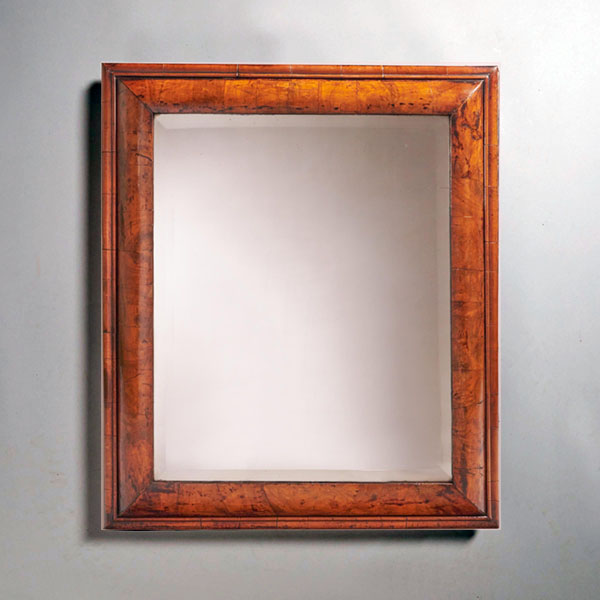
A Fine William and Mary 17th Century Figured Walnut Cushion Mirror C, 1690
A Fine William and Mary 17th Century Figured Walnut Cushion Mirror C, 1690 £6,500Follow UsA Fine William and Mary 17th Century Figured Walnut Cushion Mirror C, 1690 A large William and Mary 17th century figured walnut cushion mirror, circa...
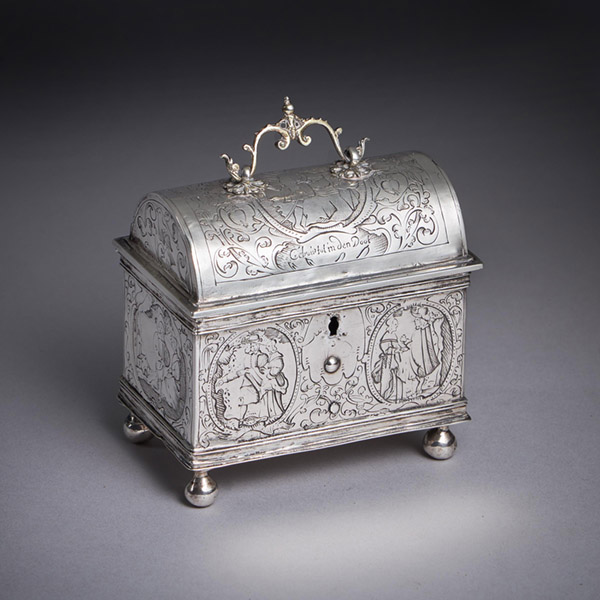
A museum-grade mid-17th century Dutch silver marriage casket or knottekistje, circa 1660
A museum-grade mid-17th century Dutch silver marriage casket or knottekistje, circa 1660 £9,500 [wpforms_selector form_id="11387" show_title="on" _builder_version="4.22.1" _module_preset="default" custom_margin="-30px||||false|false"...
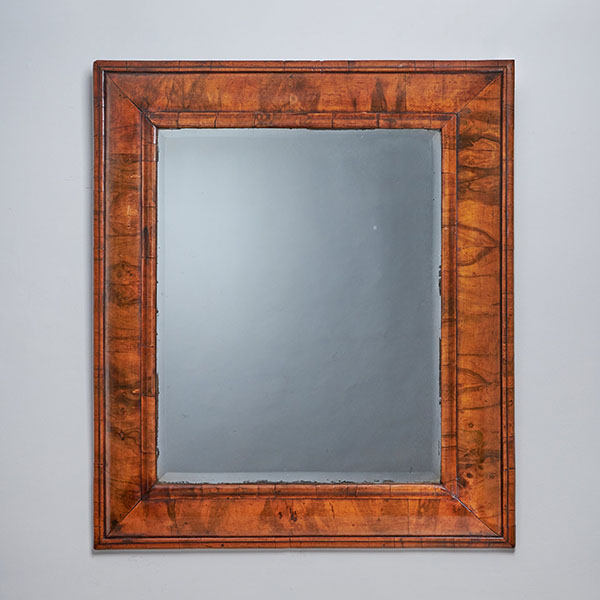
Large William and Mary 17th Century Figured Walnut Cushion Mirror c, 1690
Large William and Mary 17th Century Figured Walnut Cushion Mirror c, 1690 £7,495[wpforms_selector form_id="11387" show_title="on" _builder_version="4.22.1" _module_preset="default" custom_margin="-30px||||false|false" global_colors_info="{}"...
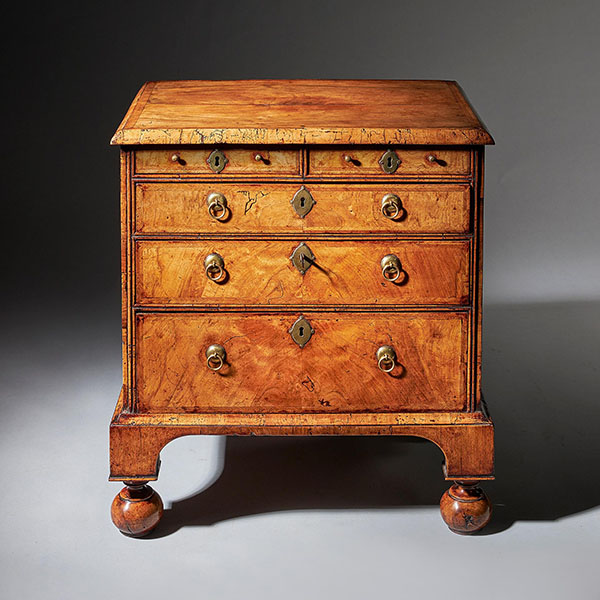
An extremely rare George I walnut chest of small proportions on ball and bracket
An extremely rare George I walnut chest of small proportions on ball and bracket £18,800[wpforms_selector form_id="11387" show_title="on" _builder_version="4.22.1" _module_preset="default" custom_margin="-30px||||false|false"...
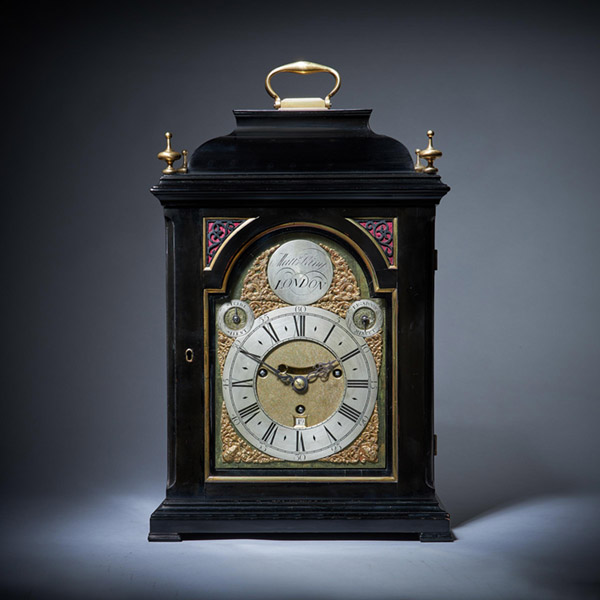
A Rare 18th Century George II Musical Table Clock by Matthew King, c. 1735.
A Rare 18th Century George II Musical Table Clock by Matthew King, c. 1735. £24,500[wpforms_selector form_id="11387" show_title="on" _builder_version="4.22.1" _module_preset="default" custom_margin="-30px||||false|false"...
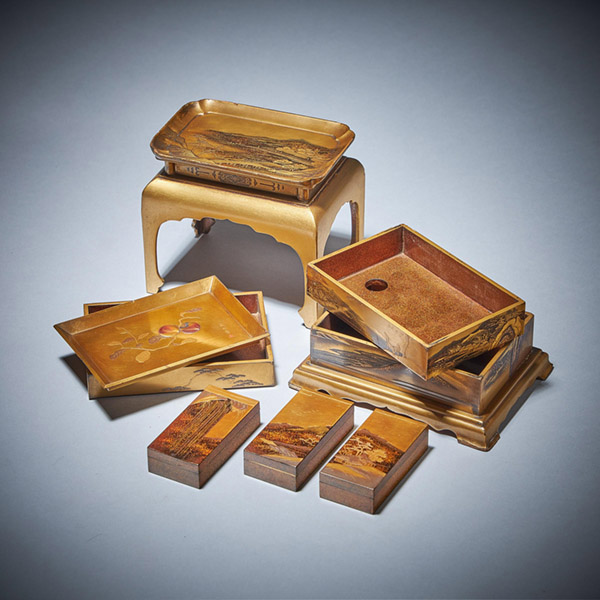
Signed Mid 19th C. Edo/Meiji Period Diminutive Lacquer Stacking Cabinet, Japan
Signed Mid 19th C. Edo/Meiji Period Diminutive Lacquer Stacking Cabinet, Japan £5,800[wpforms_selector form_id="11387" show_title="on" _builder_version="4.22.1" _module_preset="default" custom_margin="-30px||||false|false"...

A Fine William and Mary 17th Century Figured Walnut Cushion Mirror C, 1690
A Fine William and Mary 17th Century Figured Walnut Cushion Mirror C, 1690 £6,500Follow UsA Fine William and Mary 17th Century Figured Walnut Cushion Mirror C, 1690 A large William and Mary 17th century figured walnut cushion mirror, circa...

A museum-grade mid-17th century Dutch silver marriage casket or knottekistje, circa 1660
A museum-grade mid-17th century Dutch silver marriage casket or knottekistje, circa 1660 £9,500 [wpforms_selector form_id="11387" show_title="on" _builder_version="4.22.1" _module_preset="default" custom_margin="-30px||||false|false"...

Large William and Mary 17th Century Figured Walnut Cushion Mirror c, 1690
Large William and Mary 17th Century Figured Walnut Cushion Mirror c, 1690 £7,495[wpforms_selector form_id="11387" show_title="on" _builder_version="4.22.1" _module_preset="default" custom_margin="-30px||||false|false" global_colors_info="{}"...

An extremely rare George I walnut chest of small proportions on ball and bracket
An extremely rare George I walnut chest of small proportions on ball and bracket £18,800[wpforms_selector form_id="11387" show_title="on" _builder_version="4.22.1" _module_preset="default" custom_margin="-30px||||false|false"...

A Rare 18th Century George II Musical Table Clock by Matthew King, c. 1735.
A Rare 18th Century George II Musical Table Clock by Matthew King, c. 1735. £24,500[wpforms_selector form_id="11387" show_title="on" _builder_version="4.22.1" _module_preset="default" custom_margin="-30px||||false|false"...

Signed Mid 19th C. Edo/Meiji Period Diminutive Lacquer Stacking Cabinet, Japan
Signed Mid 19th C. Edo/Meiji Period Diminutive Lacquer Stacking Cabinet, Japan £5,800[wpforms_selector form_id="11387" show_title="on" _builder_version="4.22.1" _module_preset="default" custom_margin="-30px||||false|false"...
